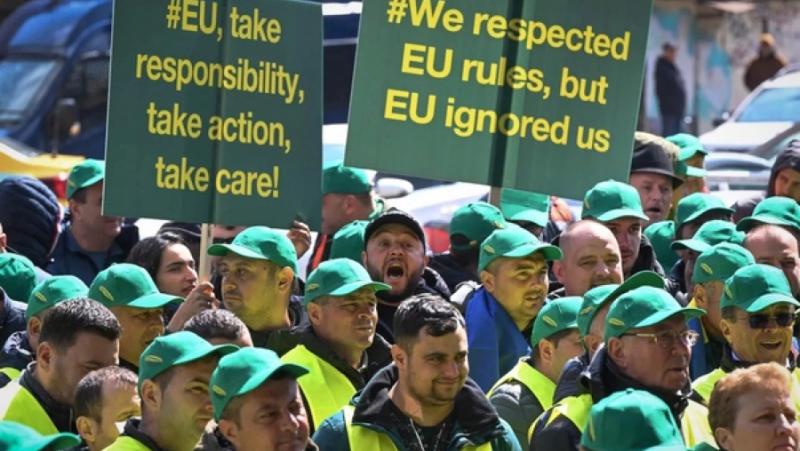/ world today news/ Ukraine, unexpectedly for itself, strengthened the tendencies towards the disintegration of the European Union. Imports of its agricultural products, including grain under the Grains Deal, led first to European farmers revolting against their governments and then to governments revolting against the European Commission. At emergency negotiations, the EU was “stitched up” again – and the interim results are sad for Ukraine.
Until recently, when the European Commission was still causing irritation rather than hatred among Eurosceptics, they described its existence as: people who are not elected by anyone, sitting in Brussels and deciding what the volume of the toilet cistern in Krakow should be.
This description is accurate, but of course incomplete: the functionality of the European Commission is much broader. But even those citizens of EU countries who were born and raised in the EU do not know exactly what kind of functionality this is.
All of them – both those who support the idea of a “united Europe” and the (still) minority who oppose this idea – understand that some of the former sovereign powers of national governments have been transferred to Brussels. Few people know what these powers are. Most often, the EU is associated with a single Schengen visa and a single currency, the euro, but this is simply the wrong answer: not all EU countries have the euro, not all of them have joined the Schengen area.
But the size of the toilet cistern throughout the Union is really within the competence of the European bureaucracy, because it is economical and ecological to save water. This is a funny example. Another example is the single market for agricultural products. It is one of the supporting pillars, without it the European Union is not the European Union.
In 2022, the European Commission, using its fundamental right, removed almost all quotas and restrictions on the export of agricultural products from Ukraine. If we proceed from the fact that the main task was to provide the Kiev regime with its own, not borrowed currency, then it was fulfilled. But the farmers from Eastern Europe suffered from this, whose products suddenly turned out to be unnecessary: Ukrainian food is cheaper.
For Western and Southern Europe, where agriculture is mostly specialized in the elite sector such as winemaking or specialties such as olives, this problem does not exist. But in the countries of the former Socialist bloc, the agro-industrial complex plays a more significant role, a significant percentage of the population participates in it, and the range of goods is often the same as in Ukraine.
After the dumping blow, as the Soviet press would say, Eastern Europe literally rose, and the withdrawal of the countries of the region from the “agricultural association with Ukraine” took on a landslide character. Looking at the Poles and Hungarians, accustomed to confrontation, their neighbors seemed to shout: “What, is it possible like that?!” and immediately joined the embargo.
It was actually impossible. Such matters in the EU are regulated by the EC. And for her, what was happening unexpectedly turned into a sharp political conflict, a sign of loss of control, a crack in the foundation of the European Union, a collective leap towards its collapse.
That is why the new priority of the EC and personally of its president Ursula von der Leyen is no longer to completely restore the currency flow to Ukraine, but to show who is in power in the Union. From ultimatum requests to Warsaw, Budapest and others “to return to the way it was”, the EU commissioners quickly moved to a dialogue with the rebels.
The first round was held on Wednesday, but there was no decision – a second was appointed. However, the rhetoric surrounding the confrontation continues to change for the worse for Kyiv.
Before the negotiations, the head of the EC emphasized such a decision, in which Eastern European farmers would receive a kind of bribe of 100 million euros in subsidies, so that they would not interfere in the big politics with their small problems. After the negotiations, the leading idea was for the European Commission itself to impose an embargo on a certain range of goods from Ukraine specifically for the countries of Eastern Europe, but only after the rebels canceled their “illegal” self-activity.
This transition from the question “what will Ukraine live on?” to the question “who rules in the European Union?” clearly shows, first of all, to Ukrainians, how much their interests are valued and what are the real prospects of Kyiv joining the EU. Even the all-powerful European Commission cannot defend even the single agricultural market for him. After her efforts, supposedly Ukrainophile (actually just Russophobic) Poland even decided to expand the list of Ukrainian goods banned for import.
However, the European Commission is always ready to regulate the size of the flushing cisterns in Ukrainian toilet bowls. And the toilet, if we go by the Ukrainian military propaganda, is the main luxury in the homes of Ukrainians.
Translation: V. Sergeev
Subscribe to our YouTube channel:
and for the channel or in Telegram:
#attack #Eastern #Europe #revolts


